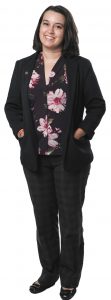Subscriber Benefit
As a subscriber you can listen to articles at work, in the car, or while you work out. Subscribe Now
Whittley Pike
Indiana University Robert H. McKinney School of Law
Indiana University Robert H. McKinney School of Law, 2014
Why did you decide to enter the legal profession?
I am the oldest daughter of two small business owners who never went to college. That I earned my bachelor’s degree was in some ways their biggest dream for me. Once I got to college, I worked with the career services office at Ball State University and discovered the field of elder law. I came to law school because I wanted to do elder law and use my love of language and passion for helping people to aid during those life transitions.
If you hadn’t pursued a legal career, what would you be doing?
22-year-old me had just finished a constituent services internship with the Indiana House of Representatives and several of my colleagues went on to work in leadership of state administrative agencies. I really enjoyed our work for the state and likely would have found myself continuing in that direction if I hadn’t attended law school.
Who is someone who has inspired you in your career?
Crystal Francis was a staff attorney at the Senior Law Project at Indiana Legal Services and my direct supervisor for my 1L summer of law school. The lessons she taught me that summer are innumerable, but some that stuck with me most had to do with building confidence in my skills as an advocate and learning how to set expectations and boundaries with my clients.
What’s the best advice you’ve ever received?
Just keep showing up. This was advice I received from my office share mate, Stasia Demos Mills, who has become a sincere mentor for me in my career ever since that second year of law school. To me it means a couple of things. First, come to work and turn the lights on every day (and celebrate that that’s doing something; your law practice is still afloat — you’re doing it!). And second, be present and show up with your whole self to each of the projects you commit to.
What makes a good lawyer/judge?
A great lawyer is someone who listens first, gets curious to ask good questions and considers the practical implications of their advice before delivering it.
How do you spend your free time?
I really enjoy getting outdoors for a good hike or to watch a soccer game with my family. During colder months, I’ve taken up cross stitch and tending to my houseplants.
If you were an animal, what would you be?
I’m still working on being a good human.
Which superpower would you rather have: invisibility or the ability to read minds?
I don’t think it’s fair to read minds — folks tell us what they want us to know. In many cases as a lawyer, I’ve found that if I’m doing my job well, I am asking the right questions to invite the information I need to get the job done.
What did you enjoy about elder law?
It was such an honor to come alongside families who were facing these big life transitions. For many folks, this is a sacred time, when we consider aging and death — the legal issues deal with how we’d like our loved ones to carry on around us at the end of our lives and after we’re gone. My absolute favorite part of my work was hosting family meetings where my client could explain the legal plan to their adult children. We facilitated some critical conversations and most importantly empowered my older clients to discuss their care wishes.
What do you enjoy now working with law students?
There is this wonderful thing that happens when I am sitting across from an aspiring attorney and I get to reflect back to them all of their strengths and unique abilities that they have shared during the appointment with me. In many cases, they receive it like it is news to them. We don’t often take time to inventory those things that make each of us wonderful, but in my office I get to help students do that. Then we work on how to play to those strengths and hone new skills for the most fulfilling career for that person.•
Please enable JavaScript to view this content.
